Ultimate Guide to Looking After a Senior Dog: Ensuring Comfort, Health, and Happiness
Are you doing enough to care for your senior pets?
Get the inside scoop on how to keep your aging furry friend happy and healthy. From diet changes to mental stimulation, learn how to support their changing needs.
Read our full guide on caring for a senior dog and making their golden years golden.
Disclaimer: This article is intended for informational purposes only and does not constitute medical advice. Always consult your veterinarian for diagnosis and treatment of any health concerns regarding your pet.
Table of Contents |
Introduction
As adult dogs age, everything changes. Just like humans, senior dogs need extra care and attention to stay healthy and happy in their golden years.
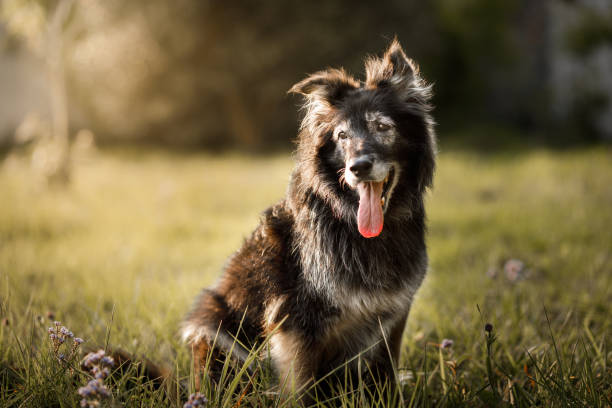
From the energetic puppy and adult stages, your aging dog will experience joint pain, decreased mobility, cognitive decline, and other age-related health issues. These changes are subtle at first but will become more apparent as your dog gets older and will require changes to their diet, exercise, and overall care.
Knowing the basics of nutrition, grooming, dental care, and regular checkups is key to making your senior dog’s golden years are as comfortable and happy as possible.
Whether it’s mobility issues, cognitive decline, or maintaining a healthy weight, your commitment to caring for your aging companion will make a big difference in their life. This guide has practical tips and advice on how to care for your elderly dog, from joint supplements to mental stimulation, so they can age well.
Senior Dog Care
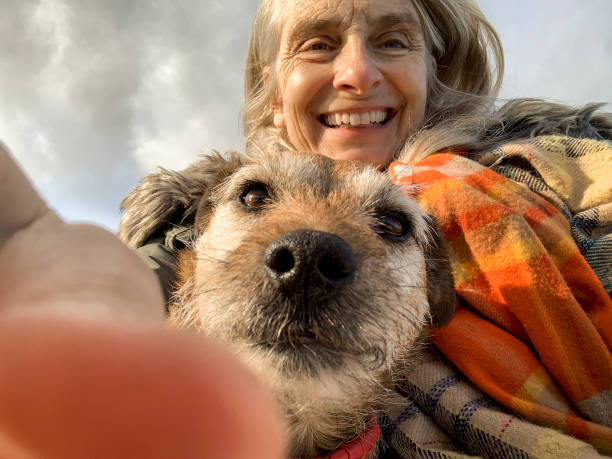
As our canine companions begin to age, they may require special attention and care to ensure they live happy and healthy lives.
Just like humans, dogs experience several physical and mental changes as they age. By learning about your elderly dog and how to best care for them, you will both be able to enjoy their golden years to the fullest.
Learning to Read Body Language
Understanding your senior dog's body language will help you connect with them and will help you identify when they are not feeling well.
Aging dogs often communicate with humans through their body language. Learning to read and listen to your dog's body language will help you understand how they are feeling and can help identify signs that your dog may not be feeling well or is in pain.
Common signals that our dogs are in pain are lethargy, hiding or protecting a body part, excessive grooming or licking, vocalization when touched, changes in posture, and insomnia. Looking out for these signs will help you to identify any spots that may be causing discomfort.
Exercise
Senior dogs benefit greatly from having a consistent exercise routine.
Exercise may need to be modified for our elderly dogs depending on their bodies. Stay in tune with how your dog is feeling during exercise and never push a dog to walk or run faster than they want to. Many senior dogs benefit from slower walks, doing training exercises, and walking or swimming in water.
Socialization
Continue to provide socialization opportunities for your elderly dog.
Socializing helps to keep your dog's mind sharp and can keep them feeling playful and spry. Giving your senior dog the chance to engage with other dogs and people will help them burn both mental and physical energy. You must find the right match for your dog in terms of playstyle to set them up for success. Many seniors may find puppies to be overwhelming.
Diet
As your dog ages, you may want to check in with your veterinarian to make sure that they should still be eating the same food.
Diet can make a big difference in canine health and as your dog's body goes through changes, they may need a slightly different set of nutrients in their food. Many brands make a senior version of their adult food as well.
Regular Checkups
Having a good relationship with a trustworthy veterinarian is a must when you have an elderly dog.
Being able to contact your veterinarian when you are feeling concerned about your dog's health will help ease your anxiety. Rather than going in once a year, your vet may want to start seeing your dog every 3-6 months. Doing so will ensure that you and your Vet catch any medical issues as quickly as possible.
Novelty
Dogs love to explore new places and smells and that goes for seniors too!
By continuing to provide novel experiences to your dog, you will be able to exercise their mind and body while going out to new spots together! Dogs also love to explore with their noses. Exploring comes with sniffing which is a relaxing and exciting activity for your elderly dog to engage in. Exploration can help keep senior dogs feeling curious and confident in their environment.
Senior Dog Supplements and Dog's Joints Health
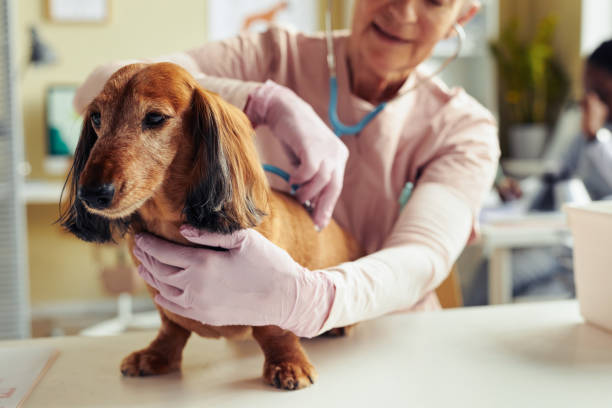
As adult dogs age, they can experience joint issues especially large breed dogs, and geriatric dog.
Supplements like glucosamine and chondroitin can help support aging joints and reduce inflammation, making life more comfortable for your dog. These supplements can be found in many senior dog foods which are specifically formulated for joint health and mobility.
If your older dog is struggling to walk or seems stiff after resting, it’s time to talk to your family vet about adding joint supplements or prescription medication.
Maintaining a healthy weight through a balanced diet is also important as excess weight puts extra strain on your dog’s joints and makes the issue worse.
Always check with your veterinarian before you start new supplements or vitamins with your senior dog.
Signs of Dog's Health Joint Issues
- Stiffness when getting up
- Slower movements
- Difficulty climbing stairs or jumping
Grooming for Senior Dogs
Aging dogs need more frequent grooming due to changes in their coat and skin as they age.
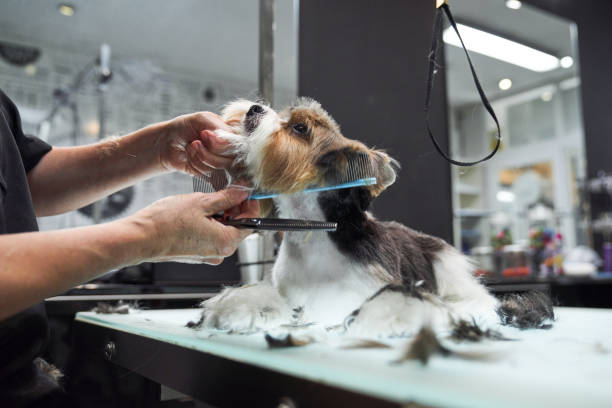
Older dogs can develop skin infections or skin tumors which need to be monitored and addressed during grooming. Regular brushing helps stimulate the skin, distribute oils, and reduce shedding, keeping your senior pet comfortable.
Senior pets can have difficulty keeping themselves clean especially if they have stiff joints or mobility issues. Trimming nails, cleaning ears, and bathing your dog with gentle, dog friendly products can prevent discomfort and skin issues.
If you find hidden skin tumors or other growths during grooming, be sure to consult your vet for further examination.
Dental Care for Older Dogs

Oral health is a big part of senior dog care that will surely improve your dog's quality of life
Dental disease is common in older dogs and can lead to more serious health issues like kidney disease and infections. As pet parents, regular teeth cleaning, whether at home or with the help of a vet, can prevent plaque buildup which causes gum disease and tooth decay.
As your dog ages, be aware of changes in their eating habits like chewing on one side of the mouth or avoiding hard food which could be a sign of dental discomfort.
Switching to softer food or adding dental chews can help maintain your dog’s oral health and make mealtime more comfortable for them.
Mental Stimulation for Older Dogs

Just like humans, aging dogs can experience cognitive decline.
Canine cognitive dysfunction, also known as dog dementia affects a dog’s ability to learn, remember, and navigate their environment. Providing mental stimulation for your dog can delay the onset of cognitive issues and keep them sharp.
Engage your senior dog with puzzle toys, simple training exercises, and new tricks that challenge their mind. Daily activities that encourage mental stimulation like sniffing games or learning new tricks can improve their overall health and slow down cognitive aging.
These activities can prevent canine cognitive dysfunction and keep your pet mentally alert.
Tips for Mental Stimulation:
- Hide treats around the house for a sniffing game
- Use puzzle toys to challenge your dog’s mind
- Incorporate gentle training sessions with new commands
Adjusting Your Home for Senior Dogs

As dogs age, their mobility and comfort needs change. Senior and geriatric dogs may struggle with common household obstacles like slippery floors or stairs. Add non-slip rugs, ramps, and orthopedic dog beds to help your senior dog move around the house more easily and comfortably.
Keep your dog’s environment free from hazards that can cause injury. For example, placing your dog’s food, water, and bedding on the ground floor of your home can prevent unnecessary stair climbing.
Simple changes to your home can improve your dog’s life and reduce the risk of injury.
Recognizing and Managing Health Issues in Senior Dogs
As dogs enter their senior years they are more prone to health issues like kidney disease, liver disease, and other age-related conditions.
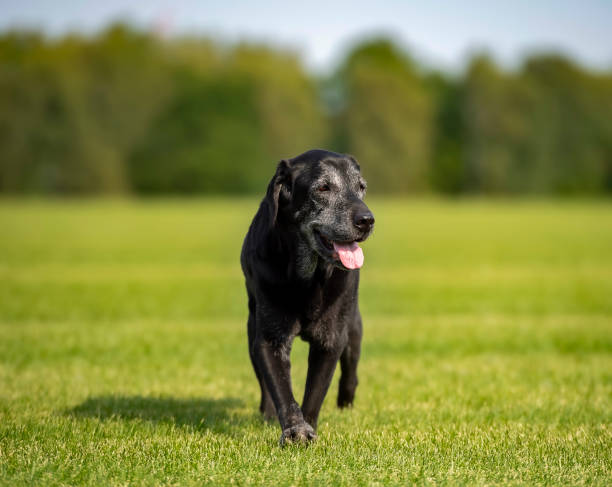
Regular vet checkups are crucial in catching these issues early and managing them before they become severe. Some senior dogs may develop chronic kidney disease which requires dietary changes and medication.
Plus, monitoring your senior dog’s weight and keeping them at a healthy weight can prevent weight gain and other health problems.
Early detection of conditions like canine cognitive dysfunction or kidney disease means your dog can get the right care and live a healthier life.
Common Health Issues in Senior Dogs:
- Kidney disease
- Liver disease
- Canine cognitive dysfunction
- Dental disease
Conclusion
Caring for a senior dog is a great experience that requires patience, understanding, and awareness of their changing needs.

As dogs age their health, mobility, and mental sharpness may decline but with the right care, you can help them live comfortably and happily in their golden years.
The changes you make to their diet, exercise routine, grooming habits, and mental stimulation activities can make a big difference to their overall well-being.
By being aware of the signs of aging – joint stiffness, changes in eating habits, or a decrease in cognitive function – you can take proactive steps to address these issues and prevent further complications.
Your senior dog has been by your side for many years and giving them the care they deserve in their twilight years is a way of repaying the love and loyalty they’ve shown you. Whether it’s through regular vet visits, a balanced diet, joint supplements, or mental exercises, you’re improving their quality of life.
FAQs
1. How do I know if my senior dog is in pain?
Signs of pain in senior dogs are limping, lethargy, whining when touched, changes in posture and difficulty getting up.
2. How much exercise does a senior dog need?
Senior dogs still need daily exercise but it should be adjusted according to their mobility and comfort. Short walks, swimming or low impact activities are best.
3. When should I switch to senior dog food?
Consult your vet about switching to senior dog food around the time your dog becomes a senior, usually around 7-10 years old depending on breed size.
4. How do I support my senior dog’s joint health?
Joint supplements like glucosamine and a balanced diet can support joint health. Ask your vet for advice.
5. What are mental stimulation activities for senior dogs?
Puzzle toys, hide and seek games and gentle training exercises.





